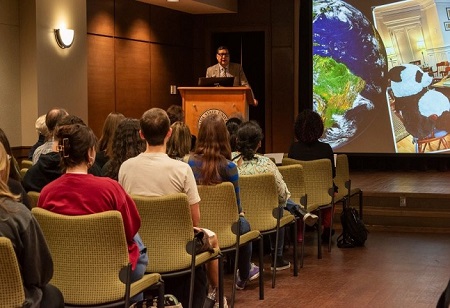Adil Najam, President of the World Wide Fund for Nature (WWF), stressed the critical importance of addressing environmental degradation in his keynote speech at the 10th annual South Asian Media and Cultural Studies (SAMCS) Conference held at Florida State University. The conference was jointly hosted by the College of Communication and Information, the Ruth K. & Shepard Broad International Lecture Series of the College of Social Sciences and Public Policy, and the Engage Your World Speaker Series of the Center for Global Engagement.
The SAMCS Conference serves as a prominent international forum for researchers, academics, and practitioners dedicated to advancing media and cultural research, policies, and practices within South Asia. With this year's theme, "Digital for Good," the conference centered on the pivotal role of digital platforms in reshaping social, cultural, and political dynamics across the South Asian subregion. In his keynote address, Najam discussed the environmental, financial, communication, global and health aspects of climate change. He proposed that “the age of adaptation fundamentally changes the nature of climate policy and politics. It introduces new challenges and opportunities to communicating".
In his dual roles as President of WWF International and Professor of International Relations and Earth and Environment at Boston University, Najam elucidated the urgent and immediate nature of the challenge posed by climate change, particularly for countries that are highly vulnerable economically, politically, and climatically. Asserting that we have entered an era necessitating adaptation, Najam emphasized the imperative to approach climate and development issues from a global standpoint rather than merely an international one.
His presentation resonated with the more than 100 students, faculty, staff and conference attendees in The Globe Auditorium. “My academic background is research about activism through citizen journalism in the remote regions of India", said Pooja Ichplani, FSU doctoral candidate. “Watching these talks, which presented similar initiatives in participatory media not just within India but also in Bangladesh and Pakistan, makes me appreciative of the changing media landscape in the entire region. I am extremely grateful to learn about the research advances in South Asia and have the opportunity to network within and beyond FSU".
South Asia, encompassing the southern subregion of Asia, is delineated by both geographical and ethnic-cultural parameters. Its modern states comprise Afghanistan, Bangladesh, Bhutan, India, Maldives, Nepal, Pakistan, and Sri Lanka. The SAMCS Conference collaborated with the Department of Media Studies at CHRIST University, a deemed-to-be university located in Bangalore, India. The partnership between FSU’s School of Communication and CHRIST University was forged by Kailash Khoushik, an FSU alumnus who obtained his Ph.D. in Media Studies from the School of Communication and now serves as an assistant professor at CHRIST University. Each year, South Asian media experts are encouraged to participate in SAMCS and Media Meet, the Department of Media Studies' annual conference on media, culture, and society.
“Something about the conference that I am most proud of is the commitment to offer a global platform that brings together scholars, practitioners and policymakers without any registration cost", said Vaibhav Diwanji, executive director of the SAMCS Conference and research assistant professor at the University of Kansas. “I am also very proud of the lifelong relationships I have developed with our speakers, presenters, and other dignitaries across the globe. I am honored and humbled to be a part of such an important initiative. Here’s to many more successful decades of the conference".
The SAMCS conference commenced with a virtual networking session, fostering an environment for attendees to showcase their research and connect with colleagues in the discipline. Following this, the program featured four presentation panels, with speakers hailing from various universities across the globe, including nations such as India, Pakistan, the United Arab Emirates, Germany, and the United States. These panels addressed topics including the digital evolution of the South Asian media landscape, digital citizenship, cultural implications of digitalization, knowledge dissemination in the digital age, and leveraging digital media for fostering an inclusive and sustainable South Asia.

